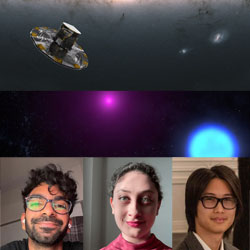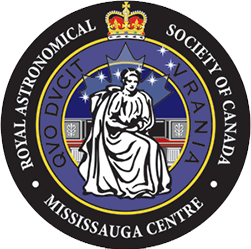
- This event has passed.
Gaia Mission & Binary Star HD 165401
April 28, 2023 @ 8:00 pm - 10:00 pm

Join Us for Two Presentations by University of Toronto Students.
The Gaia Space Mission
Presented by: Ing Xhu Lim
The Gaia Space mission was a mission launched by the European Space Agency in 2013 to collect astronomical data on the stars in our milky way. The spacecraft aims to measure stars and planets and build the largest (to date) 3D catalog. It used 3 important sensors; Astro, BP/RP, and RVS, which allowed us to gather data on a star’s position, brightness, and motion. The Gaia mission collected astronomical data on over 1 billion stars within its range such as their position as well as their estimated temperature and rotation period. The data provided by Gaia can then be used to create accurate stellar maps of our local neighborhood. Gaia’s data is open for the public to use, taking such data we’re able to determine in bulk the location of stars through parallax right ascension and declination. As for the star’s color, we can make a good estimate of its color through the black body spectrum caused by the star’s temperature. A blackbody spectrum is a spectrum of the wavelengths of radiation, by taking the ones that are in the visible light range we can create a good estimate of what the star would look like if we could see it for ourselves. Through a code in Python, we can feed a bulk amount of data generated by Gaia to create a 3D map for any chunk of data that we want to analyze.

Ing Xhu Lim is an undergraduate student at the University of Toronto. He is currently taking Astronomical Science and Physics.
Analysis of the Binary Star HD 165401
Presented by: Ziyyad Ali & Tabassom Madayen
We present an analysis of a binary star HD 165401. The sunlike star was thought to be an old Population II star with an age of at least 10 Gyrs due to its kinematics, however, it has indicators of youth leading Astronomers to believe the star is a Blue Straggler – a star that has gained mass from a close by companion. This would cause HD 165401 to appear bluer and have a higher magnetic activity compared to a typical Population II star. By visually observing the star using the Keck II telescope, along with a 17 yearlong Radial Velocity (RV) dataset, we discovered a faint companion HD 165401 Ab. Analyzing this data, we identified HD 165401 Ab as a white
dwarf with a mass of M = and a cooling age of = 3 Gyrs. This means that it has been only 3 Gyrs since HD 165401 has become a white dwarf and was likely a 5-solar mass star before leaving the main sequence. HD 165401 A would have been smaller in comparison to its current state and gained mass during the planetary nebula phase of HD 165401 Ab, effectively prolonging its main sequence lifetime.

Tabassom Madayen is a fourth-year undergraduate student at the University of Toronto Mississauga doing Astronomical specialist.
For the past year she has been doing research with Dr Lea Hirsch on discovery and characterization of two nearby binary systems. With previous experience working on contact binary star systems, her current field of study is stellar astronomy which contains discovery and classification of stars in binary systems.

Ziyyad Ali is a fourth-year undergraduate student at the University of Toronto Mississauga doing an Astronomy major, Physics, and a Computer Science minor.
For the past year he has been doing research with Dr Lea Hirsch on the discovery and characterization of two nearby binary systems. He has previous experience working with Neural Networks and Machine Learning. His current field of study is using Machine Learning methods in astronomy.
Join us in-person at the University of Toronto – Mississauga or via Zoom:
